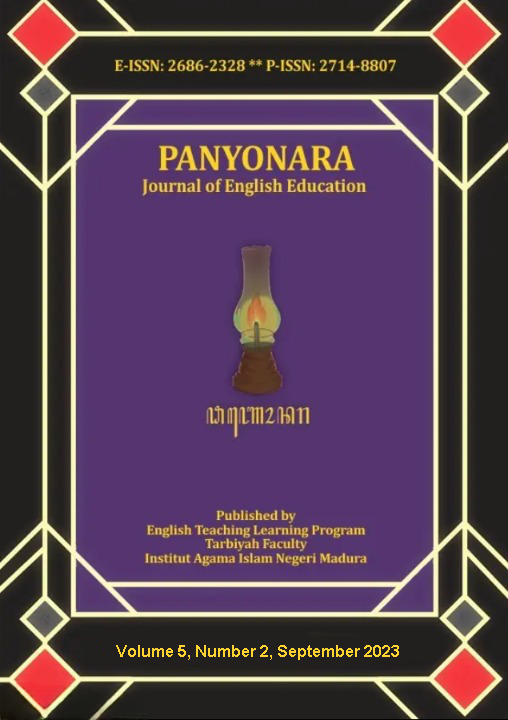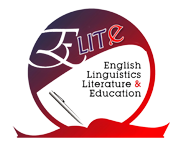Examining Emancipated Curriculum Development in Middle Schools: A Case Study
 Abstract views: 1331
,
Abstract views: 1331
,
 PDF downloads: 1173
PDF downloads: 1173
Abstract
Indonesia's education system has been facing a significant learning crisis, as evidenced by the country's declining scores in the 2018 PISA results and its expected drop in the English Proficiency Index ranking in 2022. To tackle this challenge, Indonesia has introduced an Emancipated Curriculum that aims to transform learning in the country. The Emancipated Curriculum is designed to be student-centered, differentiated learning, project-based learning, exploratory learning, and holistic learning. This study discusses the discussion of the Kurikulum Merdeka, school perceptions about the meaning of the Independent Curriculum, implementation in secondary schools. This research uses qualitative research with a case study method. The data in this research was obtained from interviews and documents. The findings show that teachers plan the curriculum with a focus on critical and creative thinking, develop their own learning materials to enhance students' cognitive abilities, and make changes to syllabi and lesson plans. However, the study also reveals that the learning media being developed is not yet digital, which may hinder the effective implementation of the Emancipated Curriculum. Furthermore, traditional learning approaches still dominate the assessment and learning processes. Overall, this study sheds light on the development of the Emancipated Curriculum and highlights the need for further research in this area.
Downloads
References
Archer-Kuhn, B., Lee, Y., Finnessey, S., & Liu, J. (2020). Inquiry-based learning as a facilitator to student engagement in undergraduate and graduate social work programs. Teaching and Learning Inquiry, 8(1), 187–207. https://doi.org/10.20343/TEACHLEARNINQU.8.1.13
Arisanti, D. A. K. (2022). Analisis Kurikulum Merdeka Dan Platform Merdeka Belajar Untuk Mewujudkan Pendidikan Yang Berkualitas. Jurnal Penjaminan Mutu, 8(02), 243–250. https://doi.org/10.25078/jpm.v8i02.1386
Bumela, L. (2020). Designing 21st century language learning scenario in Indonesia: A Perspective from computer-assisted language learning. Indonesian Journal of Arabic Studies, 2(1), 1–30.
Bumela, L. (2021). LEARNERS’AGENCY IN FOCUS: INTRODUCING THE 21ST CENTURY ACADEMIC WRITING PEDAGOGY IN INDONESIA.
Dwi Helyanti, N., & Bumela, L. (n.d.). KURIKULUM MERDEKA REIMAGINED: ADOPTING STORY SCIENCE FOR ENGLISH LITERACY LEARNING IN INDONESIAN MIDDLE SCHOOL.
Hubbard, P. (2023). Contextualizing and Adapting Teacher Education and Professional Development. In Handbook of CALL Teacher Education and Professional Development: Voices from Under-Represented Contexts (pp. 3–14). Springer.
HUBBARD, P. (2007). An Invitation to CALL Foundations of Computer-Assisted Language. Web Del Departamento de Lngüística de La Universidad de Stanford(Reino Unido) En Internet Learning Http://Www. Stanford. Edu/~ Efs/Callcourse/Index. Htm [Último Acceso 08/08/07].
Ipperciel, D. (2020). Student Centeredness as Innovation The Creation of an AI-Powered Virtual Assistant by and for Students. International Review of Information Ethics, 28, 1–12.
Kızılaslan, A., Sözbilir, M., & Yaşar, M. (2012). Inquiry based teaching in Turkey A content analysis of research reports. International Journal of Environmental & Science Education, 7(4).
Lestari, T. (2015). Peningkatan Hasil Belajar Kompetensi Dasar menyajikan ContohContoh Ilustrasi Dengan Model Pembelajaran Project Based Learning dan Metode Pembelajaran Demonstrasi Bagi Siswa Kelas XI Multimedia SMK Muhammadiyah Wonosari. Skripsi. Program Studi Pendidikan Teknik Informatika Fakultas Teknik Universitas Negeri Yogyakarta. Yogyakarta.
Lian, A. (2018). Differentiated learning and evidence from neuroscience: some implications for computer-assisted language-learning (CALL) pedagogies. Tạp Chí Khoa Học Đại Học Văn Hiến, 6(1), 5–16.
Lian, A., Lay, N., & Lian, A. (2023). Secondary Pre-service English Teachers’ Response to CALL Innovation in Cambodia. In Handbook of CALL Teacher Education and Professional Development: Voices from Under-Represented Contexts (pp. 49–63). Springer.
Lian, A., Norman, A., Midgley, K., & Napiza, C. (2017). Direct Instruction for “At-risk Children” and the Australian Curriculum: Toward a better Understanding of the Appeal of Behaviourism in Cross-cultural Contexts of Learning. In Challenges in Global Learning: Dealing with Education Issues from an International Perspective (pp. 123–141). Cambridge Scholars Publishing.
Lian, A. P., Cai, X., Chen, H., Ou, J., & Zheng, W. (2020). Cerebral lateralization induced by dichotic listening to filtered and unfiltered stimuli: optimizing auditory input for foreign language learners. Journal of Critical Reviews, 7(19), 4608–4625.
Lian, A. P., & Sangarun, P. (2017). Precision language education: A glimpse into a possible future. GEMA Online Journal of Language Studies, 17(4), 1–15. https://doi.org/10.17576/gema-2017-1704-01
Lian, A., & Sussex, R. (2018). Toward a critical epistemology for learning languages and cultures in twenty-first century Asia. Intercultural Communication in Asia: Education, Language and Values, 37–54.
McGilchrist, I. (2019). The master and his emissary: The divided brain and the making of the western world. Yale University Press.
Mulyawati, Y., Zulela, M. S., & Edwita, E. (2022). Differentiation Learning to Improve Students Potential in Elementary School. Pedagonal: Jurnal Ilmiah Pendidikan, 6(1), 68–78.
Qian, Q., Liu, Y., & Kun, H. (2021). Supporting Exploratory Learning with Questioning and Computational Thinking in Integrated STEM Education. International Journal of Elementary Education, 10(3), 93.
Rerung, N., Sinon, I. L. S., & Widyaningsih, S. W. (2017). Penerapan model pembelajaran problem based learning (PBL) untuk meningkatkan hasil belajar peserta didik SMA pada materi usaha dan energi. Jurnal Ilmiah Pendidikan Fisika Al-Biruni, 6(1), 47–55.
Rosmana, P. S., Iskandar, S., Fatimah, F. S., Aprillionita, R., Arfaiza, S. A., & Hamidah, W. (2022). Penerapan Kurikulum Prototype pada Masa Pandemi Covid-19. FONDATIA, 6(1), 62–75.
Rosmana, P. S., Iskandar, S., Fauziah, H., Azzifah, N., & Khamelia, W. (2022). Kebebasan dalam kurikulum prototype. AS-SABIQUN, 4(1), 115–131.
Satiti, A. D. R., & Falikhatun, F. (2022). Accounting Curriculum Evaluation in Implementation Merdeka Belajar-Kampus Merdeka. Assets: Jurnal Akuntansi Dan Pendidikan, 11(1), 21–35.
Soleman, N. (2020). Dinamika Perkembangan Kurikulum di Indonesia. Foramadiahi: Jurnal Kajian Pendidikan Dan Keislaman, 12(1), 1. https://doi.org/10.46339/foramadiahi.v12i1.228
Son, J.-B. (2019). Context-specific computer-assisted language learning: research, development and practice.
Son, J.-B. (2020). Technology-enhanced language teaching in action.
Sudimantara, L. B. (2021). Transformative Learning and Student Agency in Academic Writing in Undergraduate English Language Teacher Education Degree Programs in Indonesia. Charles Darwin University, Australia. Unpublished Ph. D Thesis.
Suhandi, A. M., & Robi’ah, F. (2022). Guru dan tantangan kurikulum baru: Analisis peran guru dalam kebijakan kurikulum baru. Jurnal Basicedu, 6(4), 5936–5945.
Sulistyo, L., & Waluyo, B. (2019). Project based learning model with scientific approach, implementation of children’s education of nation to facing the golden generation era. Journal of Physics: Conference Series, 1321(2), 022117.
UNESCO. (2022). Reimagining our futures together: A new social contract for education. UN.
The journal uses an Open Access policy under a Creative Commons Attribution-NonCommercial 4.0 International License. Authors who publish with this journal agree to the following terms:
- Authors retain copyright and grant the journal right of first publication with the work simultaneously licensed under a Creative Commons Attribution License that allows others to share the work with an acknowledgment of the work's authorship and initial publication in this journal.
- Authors are able to enter into separate, additional contractual arrangements for the non-exclusive distribution of the journal's published version of the work (e.g., post it to an institutional repository or publish it in a book), with an acknowledgment of its initial publication in this journal.
- Authors are permitted and encouraged to post their work online (e.g., in institutional repositories or on their website) prior to and during the submission process, as it can lead to productive exchanges, as well as earlier and greater citation of published work.
















